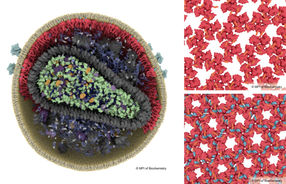CCDC Launches The FAIRE Programme to Support International Crystallography
The Frank H. Allen International Research & education Programme to provide long-term grants to enable academic structural chemistry studies in developing countries.
The Cambridge Crystallographic Data Centre (The CCDC) announces the creation of a programme to support structural chemistry research and education in developing countries around the world. This initiative provides three-year grants to qualifying universities, enabling unlimited access to the Cambridge Structural Database (the CSD), the world’s resource of small molecule crystal structures, and a platform of software applications which inform teaching and research in areas such as crystallography, drug design and development, and new materials research.
The Frank H. Allen International Research & Education Programme is dedicated to the memory of the CCDC’s former Executive Director. Dr. Allen led the Centre from 2002 to 2008, during which time he was passionate about bringing the crystallographic knowledge held within the CSD to the widest possible international community of structural chemists. The new programme helps address the challenges faced by scientists in countries with restricted financial resources. The three-year grants will be renewable, and will completely cover the costs of crystallographic database, applications and teaching materials for an entire university campus.
The development, to be announced at the 2017 International Union of Crystallography Congress, in Hyderabad, India, is warmly welcomed by Prof. Graciela Díaz de Delgado of the Universidad de los Andes, Venezuela: “The programme being created by CCDC to honour Dr Frank Allen’s legacy will certainly make a big difference to researchers and educators from many countries with financial difficulties. It will allow crystallographers and other scientists, who commonly struggle with economic hardships, to have access to the important tools centred around the Cambridge Structural Database. We are very grateful to the CCDC for establishing such a programme.” The CCDC’s Chair of Trustees, Professor Paul R Raithby FRSC, University of Bath, added “It is our mission to ensure that all researchers and educators are able to access the wealth of information contained within the CSD, and hope that through this programme we enable scientists to pursue new avenues of structural chemistry research.”
These products might interest you
See the theme worlds for related content
Topic world Protein analytics
Protein analytics provides a deep insight into these complex macromolecules, their structure, function and interactions. It is essential for discovering and developing biopharmaceuticals, understanding disease mechanisms, and identifying therapeutic targets. Techniques such as mass spectrometry, Western blot and immunoassays allow researchers to characterize proteins at the molecular level, determine their concentration and identify possible modifications.

Topic world Protein analytics
Protein analytics provides a deep insight into these complex macromolecules, their structure, function and interactions. It is essential for discovering and developing biopharmaceuticals, understanding disease mechanisms, and identifying therapeutic targets. Techniques such as mass spectrometry, Western blot and immunoassays allow researchers to characterize proteins at the molecular level, determine their concentration and identify possible modifications.





























































